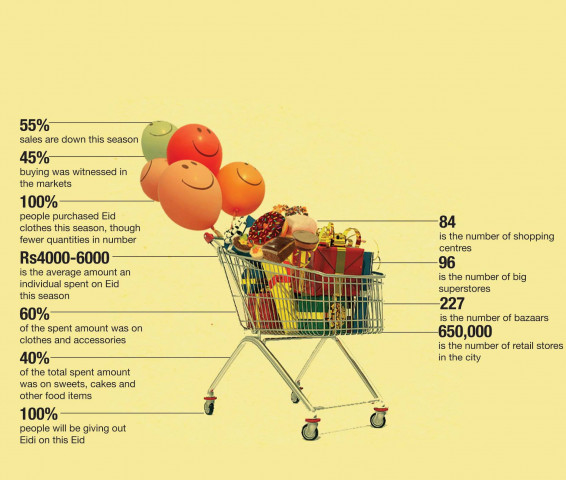Everything flooded except for markets this Eid
Traders say Eid-ul Fitr best selling period in the past with up to 1,000% profits, current situation desolate.

Abdul Majeed, a salesman at Dolmen Mall Karachi, said that the first two weeks of Ramazan had been slower than usual, which had given the traders a sign of what was to come in the ten days prior to Eid. “The first Ashura of Ramadan is always slow as people are adjusting to fasting and a change in routines. Sales begin to pick up after the first 15 days of Ramazan and then the last few days are a rush. However, this time around, while the market remains populated, buyers remain sparse,” he said.
Floods and the existent law and order situation have been pinpointed as the top reasons for slow sales by shopkeepers and consumers alike. Inflation has finally taken its toll on the purchasing power of customers and power shortages have also played their role in disturbing traders’ sales as customers are reluctant to shop in the heat.
Almost all traders and shopkeepers claimed that their sales had declined by at least 70 per cent this Ramazan as compared to the same period last year. However, this figure improved to a 55 per cent decline as sales of over Rs2 billion were recorded in the last two days of Ramazan.
Shopkeepers said that the number of visitors to markets had also declined by 20-30 per cent due to which the market was less crowded as compared to previous years.
Traders Action Committee Chairman Siddiq Memon stated that customers used to visit Karachi from other areas, especially the interior of Sindh, for their shopping needs. “Due to the floods, only five per cent of those customers are in Karachi, while the rest are tackling the destruction left in the wake of these floods,” he added.
He informed that traders had invested an aggregate of approximately Rs70 billion into Eid-related products, which range from clothes to accessories and shoes to home decor. However, due to a lacklustre market, stocks worth Rs40-45 billion still remained unsold.
Traders explained that they faced the prospect of massive losses due to this unsold stock. They also said that most of these goods were exclusively manufactured in line with summer trends and may no longer be in demand in the months to come. Furthermore, idle stock will cause a dearth of liquidity which will prevent these shopkeepers from investing further. Moreover, this also means that traders will have to bear warehousing and other costs.
Memon also informed that traders had reduced the prices of goods by 20 per cent in an attempt to attract customers but customers have remained disinclined to purchasing.
He informed that local traders had also imported Chinese manufactured and cheaply priced products this year to address the low income group. “The middle income group seemed more interested in these products than the low income consumers, who hardly showed up this season,” he added.
The consumers’ voice
The Express Tribune conducted a survey to discover the purchasing behaviour this Eidul Fitr. Of the 149 respondents from all over Pakistan, everyone acknowledged that they had definitely made some purchase. The average amount that participants spent was between Rs4,000 and Rs6,000 per person. This amount was significantly less than the amount spent last year, which averaged between Rs6,000 and Rs10,000 per individual.
The survey also discovered that 60 per cent of the total amount spent by respondents had been on clothes. Many said that they had spent relatively less on clothes this year by either buying cheaper clothes or by reducing the number of clothes purchased.
The remaining 40 per cent of the amount was spent on food items, sweets and other delicacies for Eid.
About 80 per cent said they had reduced their spending this year as a token of support towards flood victims while 20 per cent said that they had spent as usual.
Another reason for consumers’ curtailed buying was inflation. Jewelleries and other accessories like handbags and shoes topped the list of items that consumers plan to reuse. Of the 149 respondents to the survey, 144 were females while five were males
Published in The Express Tribune, September 11th, 2010.



















COMMENTS
Comments are moderated and generally will be posted if they are on-topic and not abusive.
For more information, please see our Comments FAQ